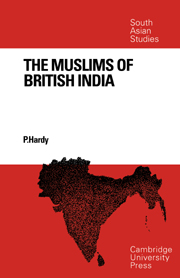Book contents
- Frontmatter
- Contents
- A note on spelling
- Acknowledgements
- 1 Introduction: the medieval legacy
- 2 The effects of British rule on Muslims before 1857
- 3 1857 and its aftermath
- 4 Muslims come to terms with British India as Muslims
- 5 Muslims move towards political community 1871–1901
- 6 Muslims acquire a constitutional identity and enter all-India politics
- 7 Religion enters politics 1910–24
- 8 The period of frustration 1924–35
- 9 The two partitions: of British India and of the Muslim community
- Maps
- A descriptive bibliography of works in European languages
- Glossary
- Index
- Frontmatter
- Contents
- A note on spelling
- Acknowledgements
- 1 Introduction: the medieval legacy
- 2 The effects of British rule on Muslims before 1857
- 3 1857 and its aftermath
- 4 Muslims come to terms with British India as Muslims
- 5 Muslims move towards political community 1871–1901
- 6 Muslims acquire a constitutional identity and enter all-India politics
- 7 Religion enters politics 1910–24
- 8 The period of frustration 1924–35
- 9 The two partitions: of British India and of the Muslim community
- Maps
- A descriptive bibliography of works in European languages
- Glossary
- Index
Summary
For both the Muslims of northern India and the British, the events of 1857 were a trauma. The savage British suppression of the Mutiny and Rising, with its destruction of Delhi as a centre of Muslim culture, and the dispersion of the descendants of Akbar and Aurangzib by execution and exile, at last forced educated Muslims to realise not only that the British were in India to stay, but also that they intended to stay on their own terms. The last illusions that they were the mayors of the Mughal palace were dissipated; the last illusions that an education in Persian and Urdu and in the Muslim religious sciences would serve both a Muslim's eternal and his worldly welfare were torn away. The British, though a mere handful of men, had successfully defied the hosts of Zion, or rather of Mecca. Their behaviour in 1857 showed that success owed nothing to superior virtue; it must therefore be success of a superior technique, the sources of which could no longer be ignored.
The British historian of British India often fails to appreciate how little British rule had touched the minds and still less the hearts of Muslims in India before 1857. Conscious that there was profound debate over whether the British should interfere with Indian custom and religious practices or whether they should introduce English education in English, the British historian often overlooks how British culture appeared to Indians and particularly Muslims before 1857.
- Type
- Chapter
- Information
- The Muslims of British India , pp. 61 - 91Publisher: Cambridge University PressPrint publication year: 1972



